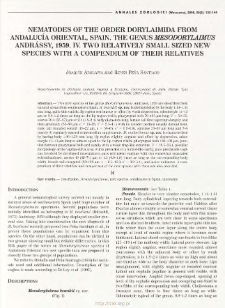- Search in all Repository
- Literature and maps
- Archeology
- Mills database
- Natural sciences
Advanced search
Advanced search
Advanced search
Advanced search
Advanced search

Object
Title: Nematodes of the order Dorylaimida from Andalucía oriental, Spain : the genus Mesodorylaimus Andrássy, 1959. 4, Two relatively small sized new species with a compendium of their relatives
Subtitle:
Annales Zoologici, vol. 50, no 2 ; Dorylaimida from Andalucía oriental, Spain ; Two relatively small sized new species with a compendium of their relatives
Contributor:
Polska Akademia Nauk. Muzeum i Instytut Zoologii
Publisher:
Muzeum i Instytut Zoologii PAN
Place of publishing:
Description:
Incorrect ISSN 0001-6454 ; Bibliogr. p. 144 ; P. 135-144 : ill. ; 24 cm
Type of object:
Abstract:
Two new species of the genus Mesodorylaimus Andrássy, 1959 are described from natural areas from southeastern Spain. M. brzeskii sp. nov.is distinguished by its body 1.141.44 μm long, quite thin cuticle, lip region continuous or offset by weak depression, odontostyle 1113 mm or 0.91.2 times as long as the lip region width, pharyngeal bulb 79105 μm long, V = 5055,uterus 70.4 (5587) μm or 2.1 (1.82.4) body diameters long, female tail first tapering abruptly and then gradually (5380 μm, c = 1628, c = 2.44.1) with its slender portion usually dorsad bent, male tail rounded conoid (1822 μm, c = 5865, c = 0.70.9), spicules 3338 μm long and 78 (rarely 9) regularly spaced ventromedian supplements. M. malacitanussp. nov.is characterized by having body 1.001.39 mm long, lip region slightly angular and offset by depression, odon-tostyle 1113 μm long or almost equal to the lip region width, pharyngeal bulb 109132 μm, junction between pharyngeal bulb and cardia with a weak ring-like structure, V = 48.556.1, peculiar morphology of the vagina-vulva area (vulva preceded of a funnel-like cavity, pars proximalis vaginae involved by developed musculature, pars refringens vaginae with two somewhat separated sclerotizations), uterus 49 (3971) μm or 1.3 (0.91.9) times as long as the corresponding body width, female tail elongated (80126 μm, c = 9.516.9, c = 3.25.1), and males unknown. A compendium of their relatives and comparison of the new species with them are also provided.
Relation:
Volume:
Issue:
Start page:
End page:
Detailed Resource Type:
Format:
Resource Identifier:
Source:
MiIZ PAN, call no. patrz sygn. czas. P.255, vol 50, no 2 ; MiIZ PAN, call no. patrz sygn. czas. P.4314, vol 50, no 2 ; click here to follow the link
Language:
Language of abstract:
Rights:
Creative Commons Attribution BY 3.0 PL license
Terms of use:
Copyright-protected material. [CC BY 3.0 PL] May be used within the scope specified in Creative Commons Attribution BY 3.0 PL license, full text available at: ; -
Digitizing institution:
Museum and Institute of Zoology of the Polish Academy of Sciences
Original in:
Library of the Museum and Institute of Zoology of the Polish Academy of Sciences
Projects co-financed by:
Programme Innovative Economy, 2010-2014, Priority Axis 2. R&D infrastructure ; European Union. European Regional Development Fund
Access:
Object collections:
- Digital Repository of Scientific Institutes > Partners' collections > Museum and Institute of Zoology PAS > Scientific Journals
- Digital Repository of Scientific Institutes > Partners' collections > Museum and Institute of Zoology PAS > MIZ PAN Publications > Annales Zoologici
- Digital Repository of Scientific Institutes > Literature > Journals/Articles
Last modified:
Feb 4, 2025
In our library since:
Sep 24, 2015
Number of object content downloads / hits:
808
All available object's versions:
https://rcin.org.pl./publication/73756
Show description in RDF format:
Show description in RDFa format:
Show description in OAI-PMH format:
Objects Similar
Braasch, Helen
Borowski, Jerzy Węgrzynowicz, Piotr
Winiszewska-Ślipińska, Grażyna
Warchałowski, Andrzej
Hołyński, Roman B.
Schuh, Rudolf
Bezděk, Jan
Pomorski, Romuald Jacek Smolis, Adrian

 INSTYTUT ARCHEOLOGII I ETNOLOGII POLSKIEJ AKADEMII NAUK
INSTYTUT ARCHEOLOGII I ETNOLOGII POLSKIEJ AKADEMII NAUK
 INSTYTUT BADAŃ LITERACKICH POLSKIEJ AKADEMII NAUK
INSTYTUT BADAŃ LITERACKICH POLSKIEJ AKADEMII NAUK
 INSTYTUT BADAWCZY LEŚNICTWA
INSTYTUT BADAWCZY LEŚNICTWA
 INSTYTUT BIOLOGII DOŚWIADCZALNEJ IM. MARCELEGO NENCKIEGO POLSKIEJ AKADEMII NAUK
INSTYTUT BIOLOGII DOŚWIADCZALNEJ IM. MARCELEGO NENCKIEGO POLSKIEJ AKADEMII NAUK
 INSTYTUT BIOLOGII SSAKÓW POLSKIEJ AKADEMII NAUK
INSTYTUT BIOLOGII SSAKÓW POLSKIEJ AKADEMII NAUK
 INSTYTUT CHEMII FIZYCZNEJ PAN
INSTYTUT CHEMII FIZYCZNEJ PAN
 INSTYTUT CHEMII ORGANICZNEJ PAN
INSTYTUT CHEMII ORGANICZNEJ PAN
 INSTYTUT FILOZOFII I SOCJOLOGII PAN
INSTYTUT FILOZOFII I SOCJOLOGII PAN
 INSTYTUT GEOGRAFII I PRZESTRZENNEGO ZAGOSPODAROWANIA PAN
INSTYTUT GEOGRAFII I PRZESTRZENNEGO ZAGOSPODAROWANIA PAN
 INSTYTUT HISTORII im. TADEUSZA MANTEUFFLA POLSKIEJ AKADEMII NAUK
INSTYTUT HISTORII im. TADEUSZA MANTEUFFLA POLSKIEJ AKADEMII NAUK
 INSTYTUT JĘZYKA POLSKIEGO POLSKIEJ AKADEMII NAUK
INSTYTUT JĘZYKA POLSKIEGO POLSKIEJ AKADEMII NAUK
 INSTYTUT MATEMATYCZNY PAN
INSTYTUT MATEMATYCZNY PAN
 INSTYTUT MEDYCYNY DOŚWIADCZALNEJ I KLINICZNEJ IM.MIROSŁAWA MOSSAKOWSKIEGO POLSKIEJ AKADEMII NAUK
INSTYTUT MEDYCYNY DOŚWIADCZALNEJ I KLINICZNEJ IM.MIROSŁAWA MOSSAKOWSKIEGO POLSKIEJ AKADEMII NAUK
 INSTYTUT PODSTAWOWYCH PROBLEMÓW TECHNIKI PAN
INSTYTUT PODSTAWOWYCH PROBLEMÓW TECHNIKI PAN
 INSTYTUT SLAWISTYKI PAN
INSTYTUT SLAWISTYKI PAN
 SIEĆ BADAWCZA ŁUKASIEWICZ - INSTYTUT TECHNOLOGII MATERIAŁÓW ELEKTRONICZNYCH
SIEĆ BADAWCZA ŁUKASIEWICZ - INSTYTUT TECHNOLOGII MATERIAŁÓW ELEKTRONICZNYCH
 MUZEUM I INSTYTUT ZOOLOGII POLSKIEJ AKADEMII NAUK
MUZEUM I INSTYTUT ZOOLOGII POLSKIEJ AKADEMII NAUK
 INSTYTUT BADAŃ SYSTEMOWYCH PAN
INSTYTUT BADAŃ SYSTEMOWYCH PAN
 INSTYTUT BOTANIKI IM. WŁADYSŁAWA SZAFERA POLSKIEJ AKADEMII NAUK
INSTYTUT BOTANIKI IM. WŁADYSŁAWA SZAFERA POLSKIEJ AKADEMII NAUK




































